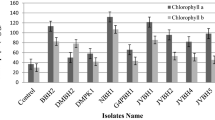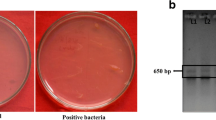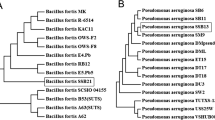Abstract
Soil salinization is a serious ecological problem affecting cereal crops including rice. Different bacterial strains have been identified and used as salt remediator in salt-affected soil, while there is confined use of halophilic bacteria. Present study was aimed to find the growth stimulatory effects of two salt-resistant Bacillus strains (NCCP-71 and NCCP-77) on biochemical changes in rice cultivars (NIAB-IR-9 and KSK-282) under control (0 mM) and different salt stress treatments (50, 100, and 150 Mm NaCl). High concentration of salinity increased the Na+ ion content and lowered the K+ and Ca+ ion contents in rice. The rice seedlings inoculated with Bacillus strains showed a decrease in Na+ content followed by an increase in K+ ion content. Calcium ions were increased by NCCP-71 in both varieties; however NCCP-77 inoculation decreased calcium ion content in KSK-282 and in NIAB-IR-9 at 50 mM NaCl. Salinity gradually lowered the contents of photosynthetic pigments; however inoculation with NCCP-71 and NCCP-77 caused a prominent increase in photosynthetic content (Chl a, Chl b, and carotenoids) under salt stress. On the other side, significant reduction in protein and nitrogen occurred with increasing salt stress. Inoculation with bacterial strains NCCP-71 enhanced protein and nitrogen content in both varieties, while inoculation with NCCP-77 enhanced nitrogen and protein content at 50 mM NaCl concentration. Both halophilic bacteria had a great impact on the biochemical characteristics of inoculated rice cultivar by modifying different biochemical processes under saline conditions.
Access this chapter
Tax calculation will be finalised at checkout
Purchases are for personal use only
Similar content being viewed by others
References
Afzal I, Basra SM, Farooq M, Nawaz A (2006) Alleviation of salinity stress in spring wheat by hormonal priming with ABA, salicylic acid and ascorbic acid. Int J Agric Biol 8:23–28
Antoun H, Prévost D (2005) Ecology of plant growth promoting rhizobacteria. In: PGPR: biocontrol and biofertilization. Springer, pp 1–38
Ashrafuzzaman M, Hossen FA, Ismail MR, Hoque A, Islam MZ, Shahidullah SM, Meon S (2009) Efficiency of plant growth-promoting rhizobacteria (PGPR) for the enhancement of rice growth Afr J Biotechnol 8
Awan JA, Salim UR (1997) Food analysis manual. Pak Vet J Publ 5:2–7
Azooz MM, Shaddad MA, Abdel-Latef AA (2004) The accumulation and compartmentation of proline in relation to salt tolerance of three sorghum cultivars. Indian J Plant Physiol 9:1–8
Bacilio M, Rodriguez H, Moreno M, Hernandez J-P, Bashan Y (2004) Mitigation of salt stress in wheat seedlings by a gfp-tagged Azospirillum lipoferum. Biol Fertil Soils 40:188–193
Bhattacharyya PN, Jha DK (2012) Plant growth-promoting rhizobacteria (PGPR): emergence in agriculture. World J Microbiol Biotechnol 28:1327–1350
Bose S, Vedamati J, Rai V, Ramanathan AL (2008) Metal uptake and transport by Typha angustata L. grown on metal contaminated waste amended soil: an implication of phytoremediation. Geoderma 145:136–142
Dagar JC, Bhagwan H, Kumar Y (2004) Effect on growth performance and biochemical contents of Salvadora persica when irrigated with water of different salinity. Indian J Plant Physiol 9:234–238
Daiz MGQ, Bebing NN, Villegas MJ, Manuel MC (2002) Cell biology, laboratory manual (fifth edition): genetics and molecular biology division. The University of the Philippines, Philippines, p 47
Grover M, Ali SZ, Sandhya V, Rasul A, Venkateswarlu B (2011) Role of microorganisms in adaptation of agriculture crops to abiotic stresses. World J Microbiol Biotechnol 27:1231–1240
Guo J, Tang S, Ju X, Ding Y, Liao S, Song N (2011) Effects of inoculation of a plant growth promoting rhizobacterium Burkholderia sp. D54 on plant growth and metal uptake by a hyperaccumulator Sedum alfredii Hance grown on multiple metal contaminated soil. World J Microbiol Biotechnol 27:2835–2844
Gururani MA, Upadhyaya CP, Baskar V, Venkatesh J, Nookaraju A, Park SW (2013) Plant growth-promoting rhizobacteria enhance abiotic stress tolerance in Solanum tuberosum through inducing changes in the expression of ROS-scavenging enzymes and improved photosynthetic performance. J Plant Growth Regul 32:245–258
Hoagland DR, Arnon DI (1950) The water-culture method for growing plants without soil. Circ Calif Agric Exp Station 347:32
Huang XD, El-Alawi Y, Penrose DM, Glick BR, Greenberg BM (2004) A multi-process phytoremediation system for removal of polycyclic aromatic hydrocarbons from contaminated soils. Environ Pollution 130(3):465–476
Huang XD, El-Alawi Y, Gurska J, Glick BR, Greenberg BM (2005) A multi-process phytoremediation system for decontamination of persistent total petroleum hydrocarbons (TPHs) from soils. Microchem J 81(1):139–147
Jamil M, Bashir S, Anwar S, Bibi S, Bangash A, Ullah F, Rha ES (2012) Effect of salinity on physiological and biochemical characteristics of different varieties of rice. Pak J Bot 44:7–13
Jamil M, Malook I, Parveen S, Naz T, Ali A, Jan SU, Rehman SU (2013) Smoke priming, a potent protective agent against salinity: effect on proline accumulation, elemental uptake, pigmental attributes and protein banding patterns of rice (Oryza Sativa). J Stress Physiol & Biochem 9(1):169–183
Jones GH (1996) Plants and microclimate, 2nd edn. Cambridge, MA, pp 72–108
Kaymak HC, Yarali F, Guvenc I, Donmez MF (2008) The effect of inoculation with plant growth rhizobacteria (PGPR) on root formation of mint (Mentha piperita L.) cuttings. Afr J Biotechnol 7:4479–4483
Kaymak HÇ, Güvenç IS, Yarali F, Dönmez MF (2009) The effects of bio-priming with PGPR on germination of radish (Raphanus sativus L.) seeds under saline conditions. Turk J Agric For 33:173–179
Khan GS (1998) Soil salinity/sodicity status in Pakistan. Soil Survey of Pakistan, Lahore 59
Khan N, Bano A, Babar MA (2017) The root growth of wheat plants, the water conservation and fertility status of sandy soils influenced by plant growth promoting rhizobacteria. Symbiosis 72:195–205
Lichtenthaler HK, Wellburn AR (1985) Determination of total carotenoids and chlorophyll a and B of leaf in different solvents. Biochem Soc Trans 11:591–592
Lunney AI, Zeeb BA, Reimer KJ (2004) Uptake of weathered DDT in vascular plants: potential for phytoremediation. Environ Sci Technol 38(22):6147–6154
Mallesh SB (2008) Plant growth promoting rhizobacteria, their characterization and mechanisms in the suppression of soil bore pathogens of Coleus and Ashwagandha, P.HD thesis, University of agricultural sciences, Dharwad
Malook I, Atlas A, Rehman SU, Wang W, Jamil M (2014) Smoke alleviates adverse effects induced by stress on rice. Toxicol Environ Chem 96:755–767
Malook I, Shah G, Jan M, Shinwari KI, Aslam MM, Rehman S, Jamil M (2017) Smoke priming regulates growth and the expression of myeloblastosis and zinc-finger genes in rice under salt stress. Arab J Sci Eng 42:2207–2215. https://doi.org/10.1007/s13369-016-2378-x
Mishra PK et al (2011) Alleviation of cold stress in inoculated wheat (Triticum aestivum L.) seedlings with psychrotolerant pseudomonads from NW Himalayas. Arch Microbiol 193:497–513
Moradi F, Ismail AM (2007) Responses of photosynthesis, chlorophyll fluorescence and ROS-scavenging systems to salt stress during seedling and reproductive stages in rice. Ann Bot 99:1161–1173. https://doi.org/10.1093/aob/mcm052
Nabti E, Sahnoune M, Ghoul M, Fischer D, Hofmann A, Rothballer M, Schmid M, Hartmann A (2010) Restoration of growth of durum wheat (Triticum durum var. waha) under saline conditions due to inoculation with the rhizosphere bacterium Azospirillum brasilense NH and extracts of the marine alga Ulva lactuca. J Plant Growth Regul 29:6–22
Nadeem S, Zahir Z, Naveed M, Arshad M, Shahzad S (2006) Variation in growth and ion uptake of maize due to inoculation with plant growth promoting rhizobacteria under salt stress. Soil Environ 25:78–84
Naheed G, Shahbaz M, Latif T, Rha ES (2007) Alleviation of the adverse effects of salt stress on rice (Oryza sativa L.) by phosphorus applied through rooting medium: growth and gas exchange … . Pak J Bot 39:729–737
Nihorimbere V, Ongena M, Cawoy H, Brostaux Y, Kakana P, Jourdan E, Thonart P (2010) Beneficial effects of bacillus subtilis on field-grown tomato in Burundi: reduction of local fusarium disease and growth promotion. Afr J Microbiol Res 4:1135–1142
Niu X, Bressan RA, Hasegawa PM, Pardo JM (1995) Ion homeostasis in NaCl. Stress Environ Plant Physiol 109:735
Olson PE, Castro A, Joern M, DuTeau NM, Pilon-Smits E, Reardon KF (2008) Effects of agronomic practices on phytoremediation of an aged PAH-contaminated soil. J Environ Quality 37(4):1439–1446
Pallai R (2005) Effect of plant growth-promoting rhizobacteria on Canola (Brassica napus. L) and lentil (Lens culinaris. Medik) plants. MSc thesis, University of Saskatchewan
Peter LP, Young VR (1980) Nutritional evaluation of proteins foods. United Nation University, Japan, p 8
Príncipe A, Alvarez F, Castro MG, Zachi L, Fischer SE, Mori GB, Jofré E (2007) Biocontrol and PGPR features in native strains isolated from saline. Soils Argent Curr Microbiol 55:314–322. https://doi.org/10.1007/s00284-006-0654-9
Qadir M, Oster JD, Schubert S, Noble AD, Sahrawat KL (2007) Phytoremediation of sodic and saline-sodic soils. In: Sparks DL (ed) Advan Agronomy, vol 96, pp 197–247
Rafique N, Raza SH, Qasim M, Iqbal N (2011) Pre-sowing application of ascorbic acid and salicylic acid to seed of pumpkin and seedling response to salt. Pak J Bot 43(6):2677–2682
Rani UM, Arundhathi Reddy G (2012) Screening of rhizobacteria containing plant growth promoting (PGPR) traits in rhizosphere soils and their role in enhancing growth of pigeon pea. Afr J Biotechnol 11(32):8085–8091
Roohi A, Ahmed I, Iqbal M, Jamil M (2012) Preliminary isolation and characterization of halotolerant and halophilic bacteria from salt mines of Karak, Pakistan. Pak J Bot 44:365–370
Roohi A, Ahmed I, Khalid N, Iqbal M, Jamil M (2014) Isolation and phylogenetic identification of halotolerant/halophilic bacteria from the salt mines of Karak, Pakistan. Int J Agric Biol 16:564–570
Ryu CM, Farag MA, Hu CH, Reddy MS, Wei HX, Pare PW, Kloepper JW (2003) Bacterial volatiles promote growth in Arabidopsis. Proc Natl Acad Sci U S A 100:4927–4932
Saharan BS, Nehra V (2011) Plant growth promoting rhizobacteria: a critical review. Life Sci Med Res 21:1–30. LSMR-21
Santos CV (2004) Regulation of chlorophyll biosynthesis and degradation by salt stress in sunflower leaves. Sci Hortic 103:93–99
Serrano R et al (1999) A glimpse of the mechanisms of ion homeostasis during salt stress. J Exp Bot 50:1023–1036
Shah G et al (2017) Halophilic bacteria mediated phytoremediation of salt-affected soils cultivated with rice. J Geochem Explor 174:59–65. https://doi.org/10.1016/j.gexplo.2016.03.011
Siringam K, Juntawong N, Cha-um S, Boriboonkaset T, Kirdmanee C (2012) Salt tolerance enhancement in indica rice (‘Oryza sativa’ L. spp. indica) seedlings using exogenous sucrose supplementation. Plant Omics 5:52
Su Y, Han FX, Chen J, Sridhar BBM, Monts DL (2008) Phytoextraction and accumulation of mercury in three plant species: Indian mustard (Brassica juncea), beard grass (Polypogon monospeliensis), and Chinese brake fern (Pteris vittata). Int J Phytoremediation 10(6):547–560
Teng S, Qian Q, Zeng D, Kunihiro Y, Fujimoto K, Huang D, Zhu L (2004) QTL analysis of leaf photosynthetic rate and related physiological traits in rice (Oryza sativa L.). Euphytica 135:1–7
Wang H, Wu Z, Zhou Y, Han J, Shi D (2012) Effects of salt stress on ion balance and nitrogen metabolism in rice. Plant Soil Environ 58:62–67
Wyn Jones R, Pollard A (1983) Proteins, enzymes and inorganic ions. In: Encyclopedia of plant physiology new series
Yildirim E, Turan M, Ekinci M, Dursun A, Cakmakci R (2011) Plant growth promoting rhizobacteria ameliorate deleterious effect of salt stress on lettuce. Sci Res Essays 6:4389–4396
Zahir ZA, Ghani U, Naveed M, Nadeem SM, Asghar HN (2009) Comparative effectiveness of Pseudomonas and Serratia sp. containing ACC-deaminase for improving growth and yield of wheat (Triticum aestivum L.) under salt-stressed conditions. Arch Microbiol 191:415–424
Zeeb BA, Amphlett JS, Rutter A, Reimer KJ (2006) Potential for phytoremediation of polychlorinated biphenyl-(PCB-) contaminated soil. Int J Phytoremediation 8(3):199–221
Zhen-hua Z, Qiang LIU, Hai-xing S, Xiang-min R, Ismail AM (2012) Responses of different rice (Oryza sativa L.) genotypes to salt stress and relation to carbohydrate metabolism and chlorophyll content African. J Agric Res 7:19–27
Zhu J-K, Liu J, Xiong L (1998) Genetic analysis of salt tolerance in Arabidopsis: evidence for a critical role of potassium nutrition. Plant Cell 10:1181–1191
Author information
Authors and Affiliations
Corresponding author
Editor information
Editors and Affiliations
Rights and permissions
Copyright information
© 2019 Springer Nature Singapore Pte Ltd.
About this chapter
Cite this chapter
Khattak, M.R. et al. (2019). Effects of Halophilic Bacteria on Biochemical Characteristics of Rice Cultivars Under Salinity Stress Conditions. In: Kumar, M., Etesami, H., Kumar, V. (eds) Saline Soil-based Agriculture by Halotolerant Microorganisms. Springer, Singapore. https://doi.org/10.1007/978-981-13-8335-9_7
Download citation
DOI: https://doi.org/10.1007/978-981-13-8335-9_7
Published:
Publisher Name: Springer, Singapore
Print ISBN: 978-981-13-8334-2
Online ISBN: 978-981-13-8335-9
eBook Packages: Biomedical and Life SciencesBiomedical and Life Sciences (R0)




